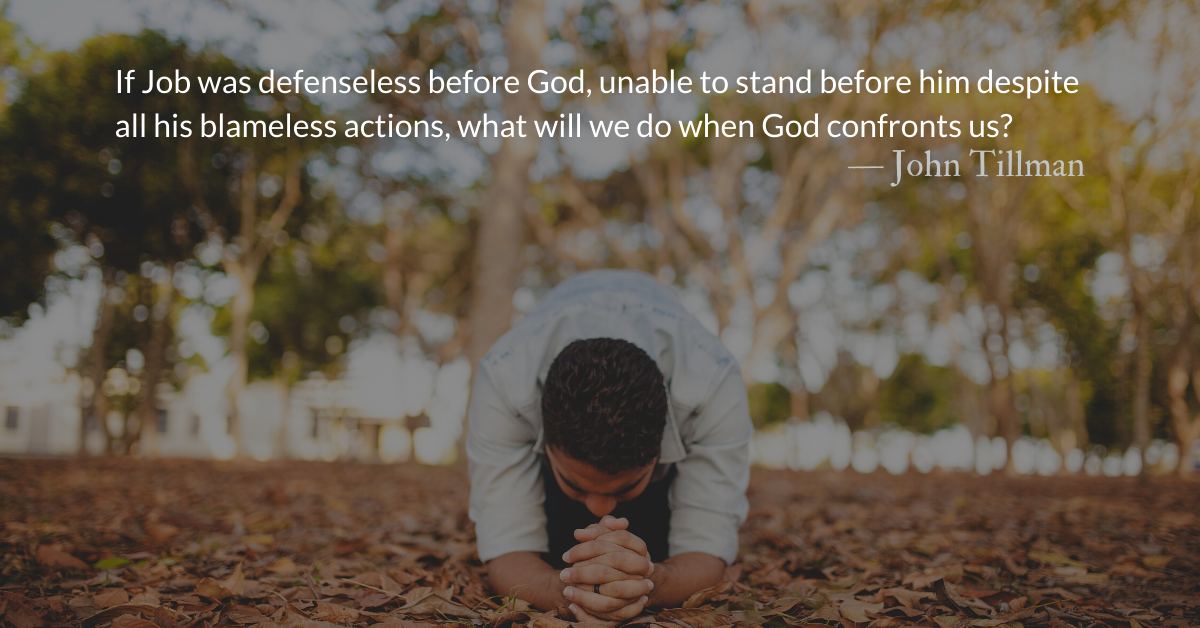Scripture Focus: Job 4.5-6
5 But now trouble comes to you, and you are discouraged;
it strikes you, and you are dismayed.
6 Should not your piety be your confidence
and your blameless ways your hope?
Reflection: Grace Over Grit
By John Tillman
Change is in the air in early January. Resolve. Renewal. Rededication.
These are all helpful and healthful in many ways. We can often affect physical, financial, and moral change with just some determination, grit, and stick-to-itiveness. But how do we treat ourselves and others when things fail or fail to produce the results we expect?
When the pious face problems, pride tells us we are being wronged. We may have a harder time accepting the situation. We’ve worked too hard for this to happen, haven’t we?
The wicked expect no “rest” (Isaiah 48.22; 57.20-21) but the righteous do. What happens when the peace and rest which the righteous expect is disturbed? This is the question Job’s narrative pokes at.
Seeing Job’s situation, his friend, Eliphaz assured Job that God was still good and that “piety” and “blameless” ways should give Job hope. He was half right.
Eliphaz and Job’s other friends will end up giving Job some terrible commentary and bad takes about his situation. (Look for more about that from Erin tomorrow.) They start as Eliphaz does, by assuring Job that if he was truly blameless then all would be well. They will end up accusing him, saying his suffering must be punishment for a sin he is concealing. I’m convinced that most of what they said came from a motivation of fear. They were looking for assurance that, “This can’t happen to me.”
If Job, the most righteous person they knew, could experience these things, then what hope did they have? What security could they hold on to? What comfort could they take, even in their current situation of blessing?
Eliphaz is right that God is good. His error, and ours, comes in turning around and putting hope and faith in other, more tangible things. God is good, as long as I have… fill-in-the-blank.
Whatever we might fill that blank in with, Job lost it. If it happened to Job, it can happen to us. Job looked like a failure to his friends but in his suffering he was faithfully following God. We need to have faith not in our grit or our gains but in God’s grace. God’s grace is sufficient. Our grit is not.
When we see sufferers like Job, we need to remember that God’s grace may be more powerfully at work in them than we can see.
Divine Hours Prayer: The Refrain for the Morning Lessons
Our help is in the Name of the Lord, the maker of heaven and earth. — Psalm 124.8
– From The Divine Hours: Prayers for Autumn and Wintertime by Phyllis Tickle.
Today’s Readings
Job 4 (Listen – 2:06)
Psalm 7-8 (Listen – 2:58)
From John: In this new year, we are tweaking our reading plan. We will still read all of the same books as are typically in our “even year” plan. However, we will read them in a roughly chronological order. We will not jump around from book to book (many books are written in overlapping times) but we will read them in an order that is as close to chronological order without breaking the books up. Readers have expressed interest in this and we are looking forward to seeing scriptures fall at new times of the year and becoming more familiar with how the writers of scripture depended on one another and finding new connections as we read in this manner. We will work on a graphic of the new reading plans over the next couple of months and will provide it when it is available. Thank you for your readership and for your prayer and financial support! Happy New Year!
Read more about Fruitful in Suffering
We can be fruitful in the land of our suffering, not by our own cleverness, craft, or scheming, but by the Holy Spirit.
Join us! Walk through the Bible with us…
Share this subscription link with friends, family, or your community of faith. Walk through the Bible with us!












